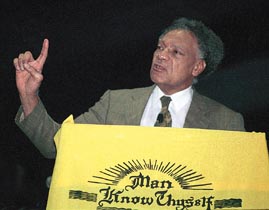
Africa: Out of the dark

Prof Ivan Van Sertima: Egypt was once part of Africa, but Egyptians lost their original African features after invasions by the Persians, Greeks, Arabs and Romans throughout the centuries gave them their modern-day features. Photo: KENRICK BOBB
By LAURA ANN PHILLIPS
June 1, 2000
IN the fifth century, women in Europe were dying because doctors there did not know how to perform caesarean sections. The European doctors had to turn to their African counterparts to learn the proper method.
This was what Prof Ivan van Sertima, professor of African Studies at Rutgers University, USA, told an audience at the Caribbean Historical Society evening held on May 26. The evening marked the 37th anniversary of African Liberation Day, celebrated on May 25, and was held at the Centre of Excellence, Macoya.
“They didn’t know [about] antiseptic,” he said of doctors in Europe at the time.
Eventually, European doctors visited African practitioners to see where they were going wrong.
“They found that Africans washed their hands in palm wine,” said the anthropologist. “Palm wine was antiseptic.”
Ancient Africans also developed anaesthetics, a vaccine for small pox and medicine for hypertension, and could treat diarrhoea and psychotic disorders.
They were producing iron and steel more than 2,000 years ago, said Van Sertima, and their quality far surpassed anything produced in the world.
“Machines were discovered in Tanzania in east Africa from the fifth century, which could reach temperatures up to 3, 275Ð Celsius,” said the Guyana-born professor.
“No other machine in the world reached those temperatures. The highest Europe had produced went up to 2, 642 degrees.
“The finest swords in Europe were produced from African steel,” he said. “It was called ‘blue steel’.”
But there was a problem.
They used wood for fuel in their production furnaces, and the growing demand for steel was depleting their forests.
They could ill afford that.
Contrary to traditional teachings, said Van Sertima, Africa is not all jungle.
“Africa has less jungle than any other continent compared with its land space,” he said. “Africa has been mis-measured—it is larger than we thought and has less jungle space.”
Africans lived closely with nature, often adapting some of creation’s ideas to improve on their own infrastructure.
“They studied ants,” said Van Sertima. “They knew how ants dealt with water coming into their nest.” This information was used to improve their drainage systems.
African people were also accomplished astronomers.
“They knew that the universe was expanding,” said the scientist. “They expressed it poetically: ‘The stars are running away from us ...’
“They knew that matter was made up of infinitely small spinning particles – atoms! They knew that the world turned on its own axis.
“Nobody knew that!
“The most advanced astronomical observatory found dates back to 300 years BC” said the professor.
“There were seven stones pointing at seven stars.”
The ancients saw that the number seven featured prominently in creation, he said, and so concluded that the number was somehow important to God.
“God seemed to express himself in sevens,” said Van Sertima. “There are seven parts of the eye, seven layers of skin, seven holes in the body.
“Seven was significant to the Africans and the Egyptians. Jesus knew that – he grew up in Egypt. Remember, ‘Out of Egypt I called My Son’?
“And Jesus was not ‘Jesus Christ’,” he said. “He was Jesus, the Christ, or ‘Krist’ [which], in Egyptian, means ‘anointed one’.”
Ancient Africans were also skilled sailors and boatbuilders.
“They were shipping elephants to China!” said Van Sertima.
“They could not have done that in those silly little canoes you would see Tarzan overturn in the movies.”
When people now hear about the achievements of ancient Africa, Van Sertima said, they try to explain them away, attributing Africa’s successes to everyone else.
Except Africa.
“Somebody came from outer space and told them about it!” he exclaimed. “Just like they say that people from outer space built the pyramids!”
African accomplishments in technology continue today, the professor pointed out, speaking of the African-American presence in the US space programme.
Van Sertima told the gathering that the education system in his country failed to teach him about the accomplishments of his ancestors.
He had to wait until his own research taught him otherwise.
“I was made to think that Africa was dark and ignorant,” he said.
“I never knew it was the beginning of advanced civilisation.”
Back to Historical Views
|
